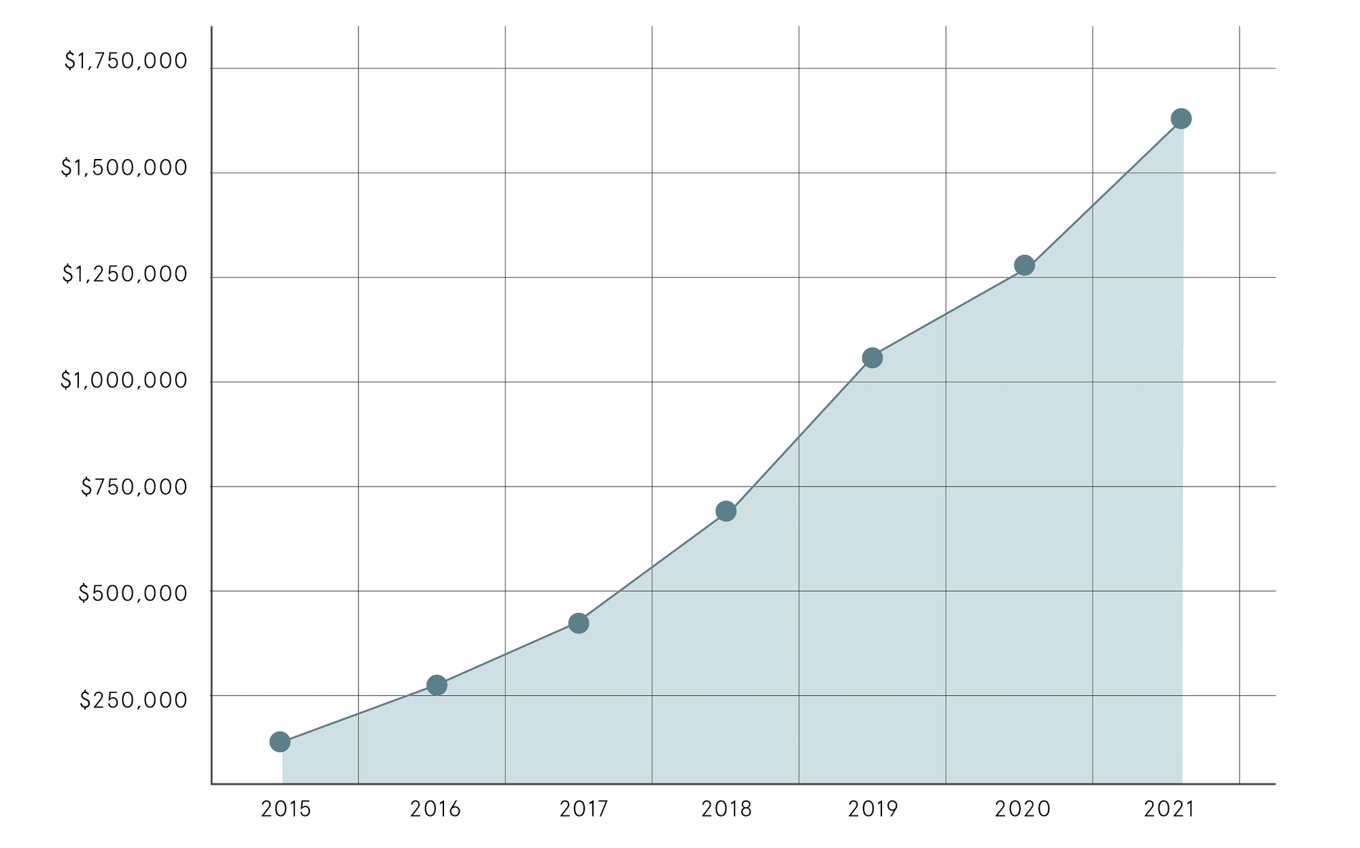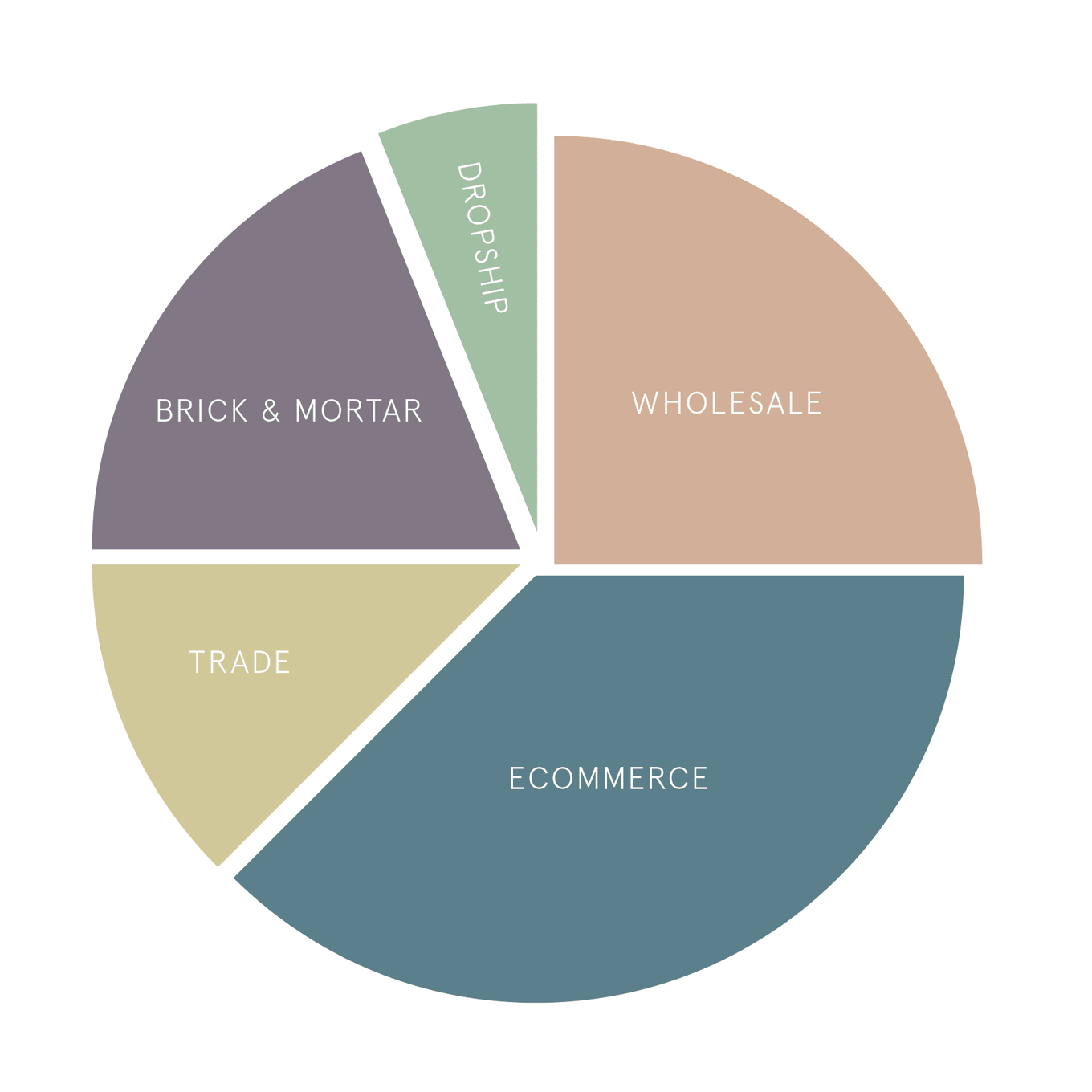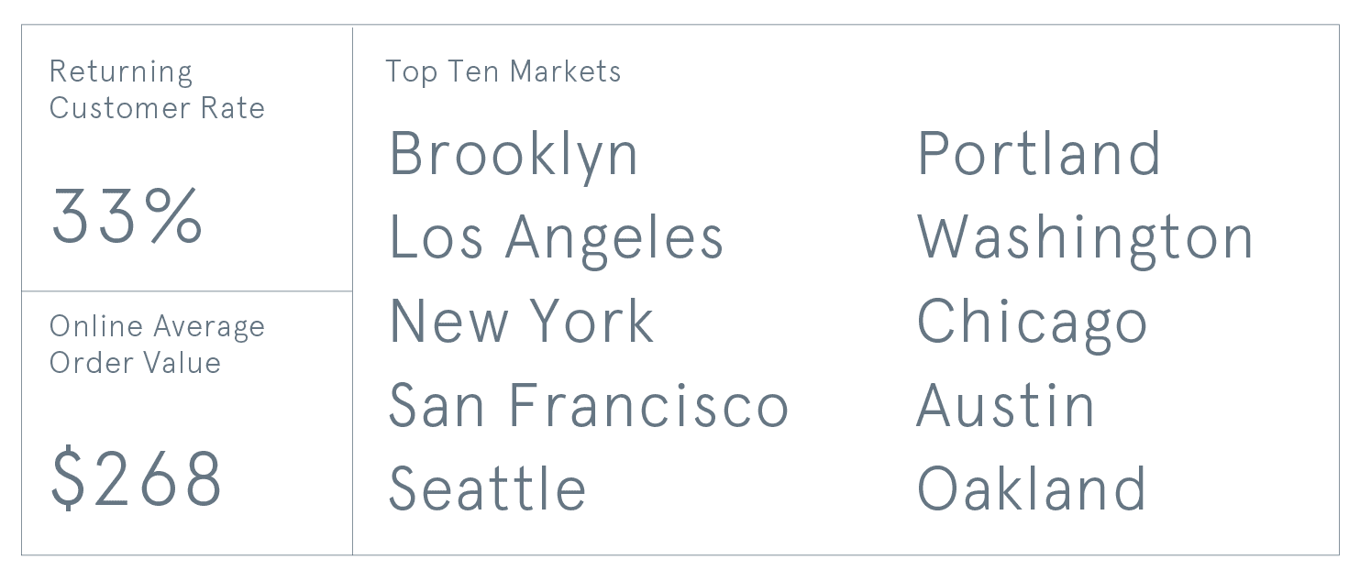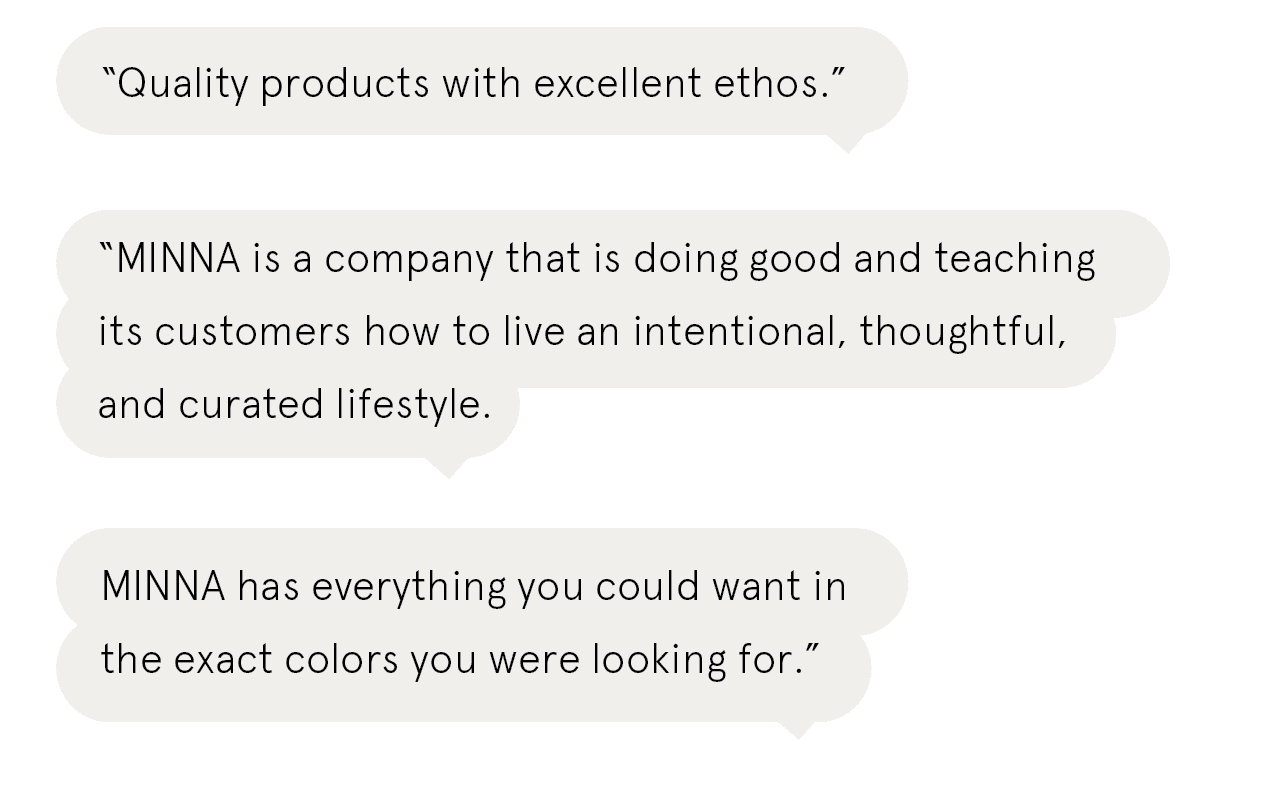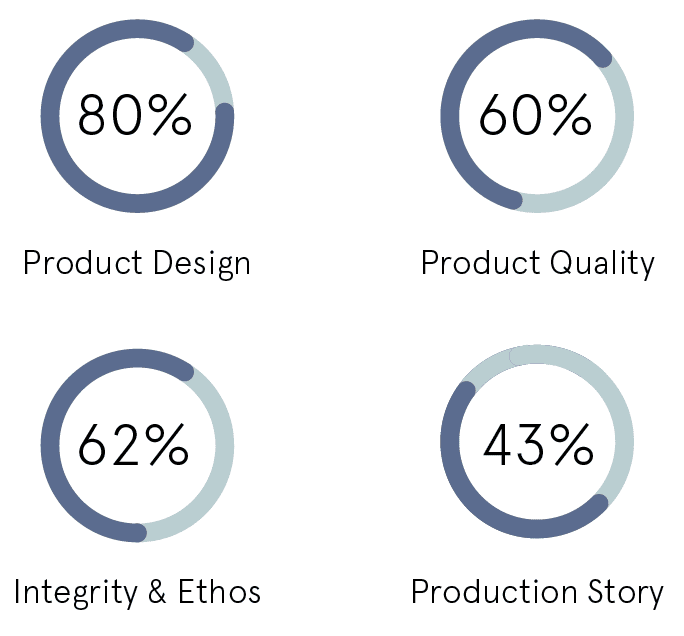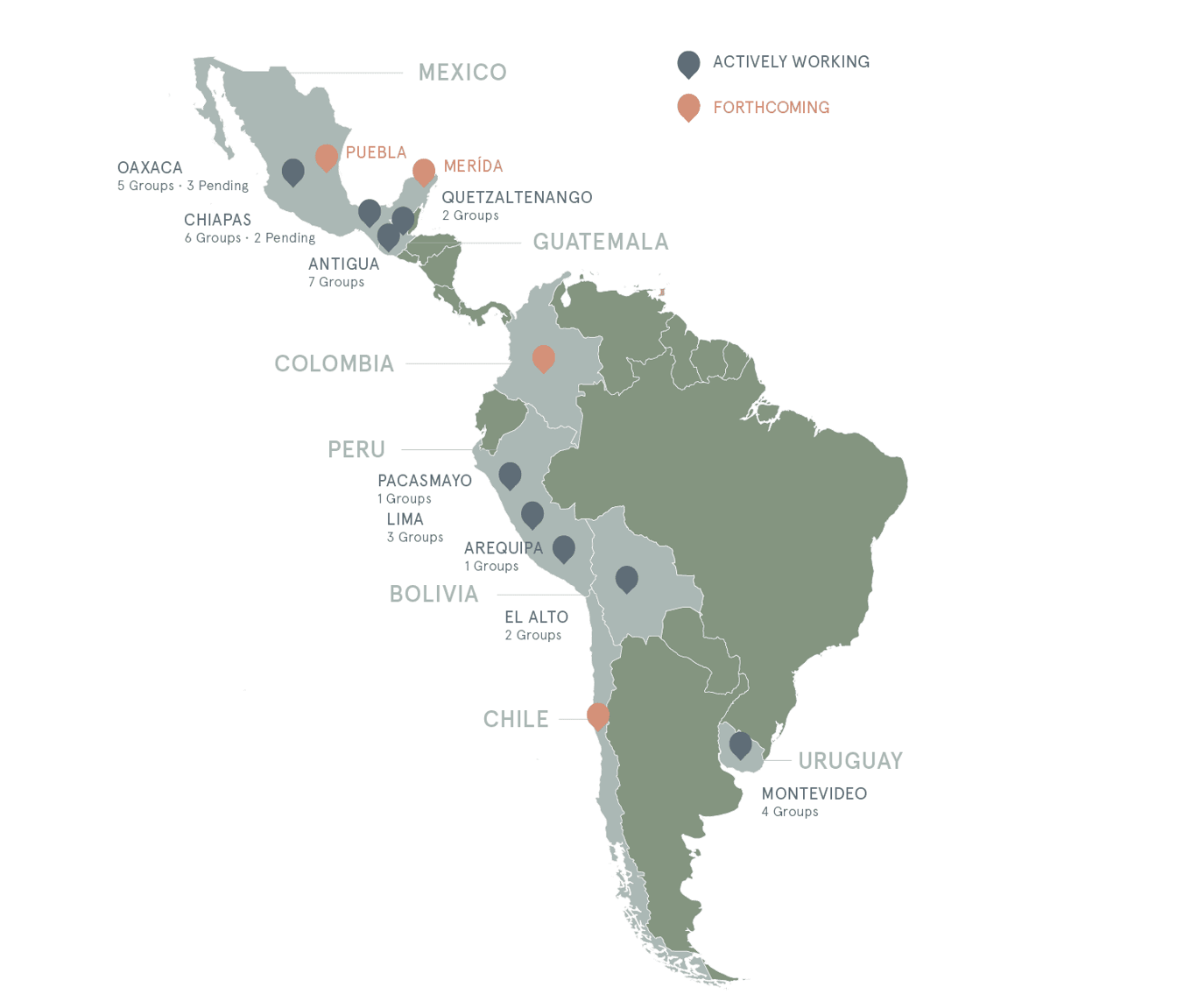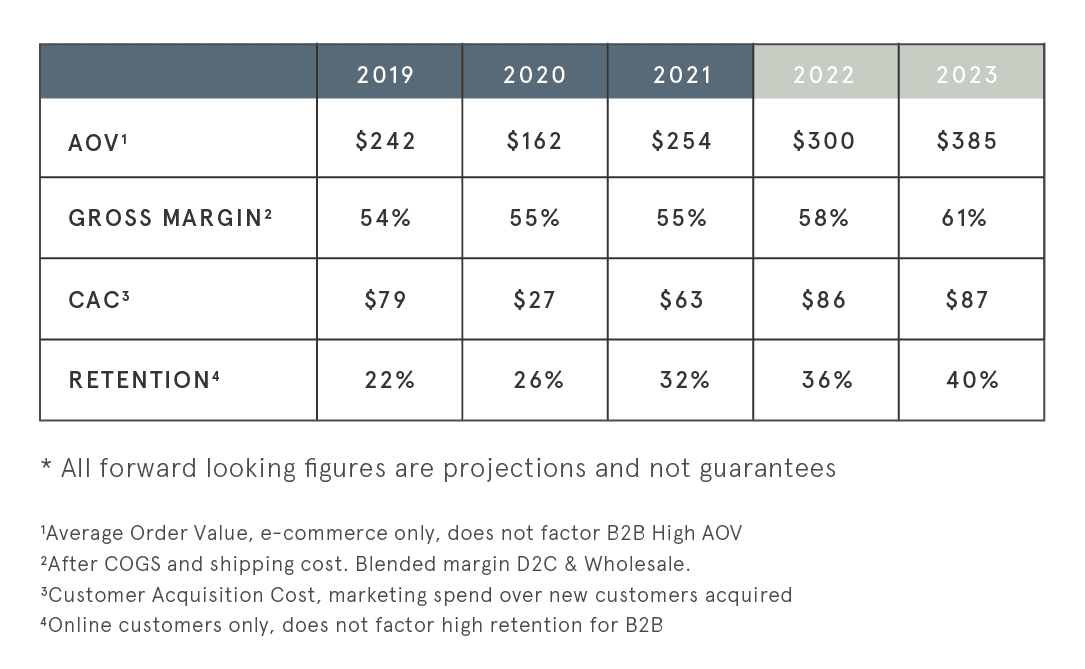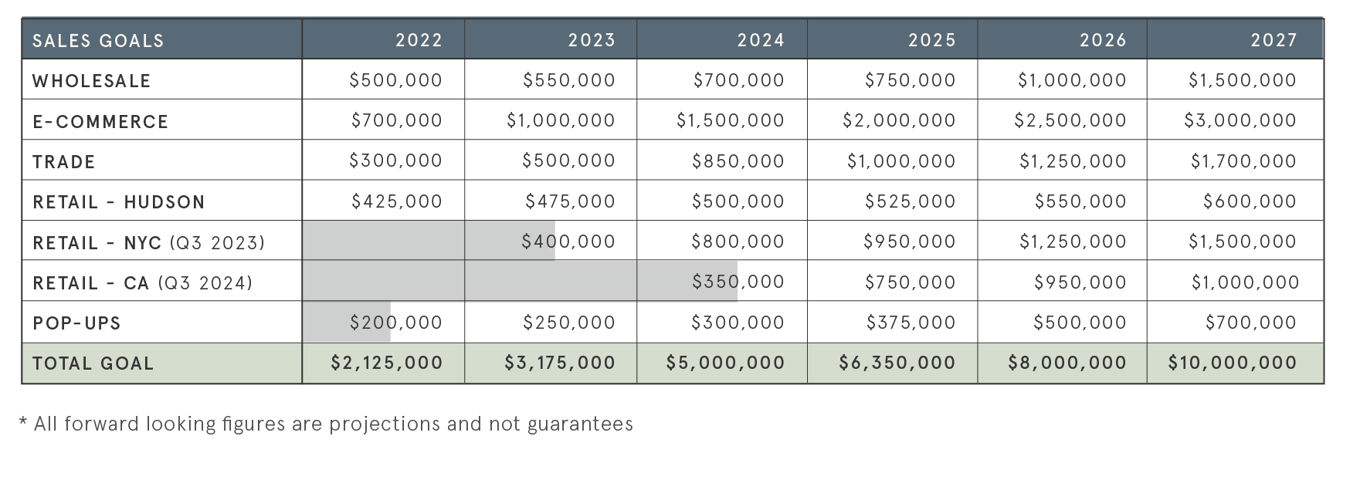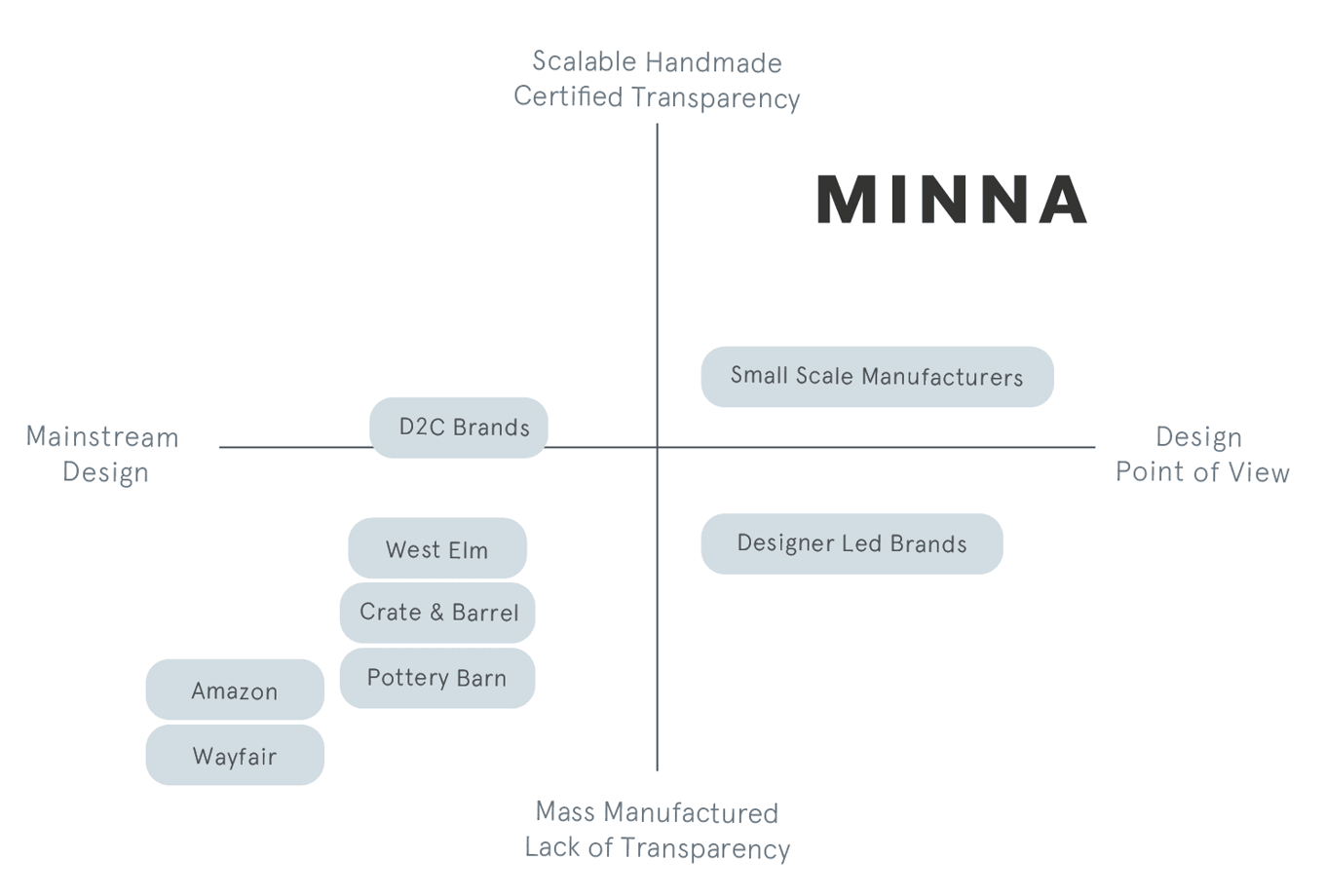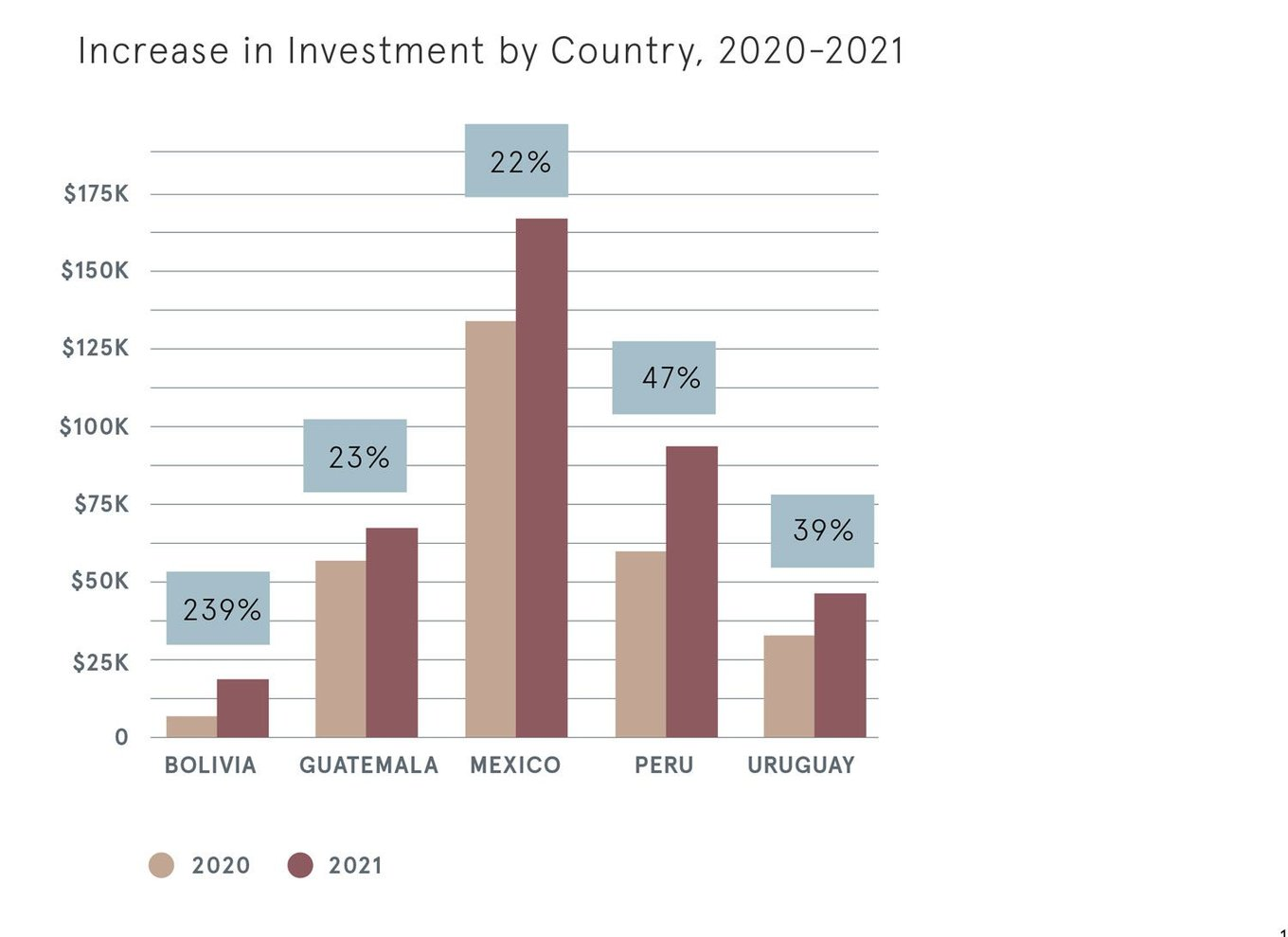MINNA
An ethically-made homewares brand collaborating with traditional artisans

Summary edit edit source
- Impact-driven company with B-Corp certification
- $1.5M+ revenue in 2021 (up 3X from 2017, 1.5X from 2019)
- Sales driven by design, production story, quality, & brand integrity/ethos
- Featured in Dwell, Goop, Vogue, Martha Stewart, Design Milk, & more
Problem edit edit source
Your home should be a reflection of your values edit edit source
Sustainability and ethical labor practices have already become top of mind in the fashion and food industries, and we believe the home goods market will soon be no different. If you care about if your food is organic and your clothing is made fairly, shouldn't you also care about how the pillow you lounge on every day or the napkins you set the table with are made?
Solution edit edit source
An ethically made homewares brand creating scalable handmade textile products in collaboration with master artisans in Mexico, Peru, Guatemala, Uruguay, and Bolivia.
MINNA creates ethically made, socially responsible goods rooted in traditional craft techniques for every room in your home. We believe that contemporary design should not sacrifice social responsibility. A certified B Corporation based in Upstate New York, we are a tight-knit, queer-led team.
Product edit edit source
Artisan made with a singular design vision edit edit source
MINNA was started by a designer, and we approach the design process from a technical understanding of textiles. We have a vast knowledge of traditional and Indigenous textile techniques throughout Latin America. Combining our contemporary aesthetic with these traditional techniques, MINNA offers a completely exclusive product to the market.
Every room in your home edit edit source
We offer over 400 SKUs for the bedroom, bath, kitchen, dining, and living room, ranging from rugs, pillows, blankets, bedding, kitchen textiles, tabletop textiles, and more.
Want to try MINNA in your home? Use the code REPUBLIC for 20% off your first order.
Traction edit edit source
Organic growth edit edit source
Since our launch in 2015, MINNA has grown organically by bootstrapping, without any outside investment. We have scaled steadily by reinvesting back into the business and dedicating ourselves to building sustainable relationships with our artisan partners.
We're omnichannel edit edit source
We have a multi-channel sales approach that sets us apart from many of our D2C only contemporaries.
A customized wholesale experience edit edit source
In 2020 we moved away from the traditional wholesale model. Instead, we’ve maintained key partnerships with top wholesale accounts, by offering co-branded exclusive products and completely customized collections.
A growing e-commerce market edit edit source
With little marketing spend we've been able to attract a loyal and returning customer base.
Hospitality and residential trade partners edit edit source
We've already been tapped by some of the most exclusive hospitality and residential designers in the world, offering both our inline catalog as well as bespoke offerings.

Brick & mortar edit edit source
We opened our first storefront in 2017 in our hometown of Hudson, NY. We’ve established ourselves as expert curators, bringing additional like-minded brands to our brick-and-mortar and e-commerce experiences. Our shop attracts locals, tourists, and designers, alike.
Customers edit edit source
Our customers are already loyal edit edit source
We asked our customers how they would describe MINNA to their best friend:
Why do customers shop at MINNA? edit edit source
Highlighted Press edit edit source
Business model edit edit source
We believe in building relationships and the power of true collaboration edit edit source
Our collaborators are our strongest asset. We work with a network of 400 artisans across 20 cooperatives in Mexico, Guatemala, Uruguay, Bolivia, and Peru.
A decentralized & diversified supply chain edit edit source
In each region, we have a centralized logistics team facilitating everything from material acquisition, to production updates, to product consolidation, before shipping to our warehouse in Upstate New York, where we distribute to all of our sales channels. We've replicated this working model in each region we work in.
Scalable handmade edit edit source
Our case for scalability? We're already doing it.
- We place frequent, consistent targeted orders which allows us a manageable cash flow and a paced way to grow artisan capacity.
- Between 2017-2019 we averaged a 177% increase in unit production.
- We partner with NGOs and local social enterprises that are skilled at building artisan capacity and connection.
We mean business edit edit source
We already have a strong AOV and low customer acquisition costs. By growing our most profitable channels, we'll see our blended gross margin reach above 60%.
A look into our five-year projections by sales channel:
Market edit edit source
The global artisan market generates an estimated $616 billion a year
Sustainability and ethical labor practices have already become top of mind in the fashion industry, and we believe the home goods market will be no different.
Competition edit edit source
We're different edit edit source
The home decor industry is vast, ranging from independent designers to mass-manufactured behemoths. We're committed to building a transparent supply chain, creating an equitable eco-system of artisan partners, all with a clear design point-of-view. These are the questions we ask ourselves when considering our place in the market:
- Is the aesthetic unique and contemporary, or safe and mainstream?
- Is the design exclusive, or only a curation of designs that can be found anywhere?
- Is it handmade and scalable, or is it mass manufactured?
Vision and strategy edit edit source
We’re building a brand for the 21st century edit edit source
Our long-term vision will always be guided by where we started: to use business to do good and use design to create impact. We believe that it is truly possible to both be profitable and equitable— to our employees, our artisan partners, all our stakeholders, our shareholders, and our customers — while simultaneously making beautiful things, ethically.
Looking Forward: edit edit source
We plan to use the funds from this round for:
1. New Hires: edit edit source
We'll make key hires in Marketing, Sales, and Production.
2. Marketing: edit edit source
With minimal advertising spending to date, we'll expand both our paid and content marketing plans, leveraging our creative strengths.
3. Brick & Mortar Expansion: edit edit source
We'll start to lay the groundwork for two new brick & mortar locations by 2025.
4. Product Development: edit edit source
We already touch on every corner of the home and have a product roadmap (and artisan network) for expansion.
5. Artisan Initiatives: edit edit source
Lay the groundwork for a robust artisan training program in partnerships with leaders in the communities we work in.
Impact edit edit source
Considering our impact is core to who we are edit edit source
We believe good design goes hand-in-hand with being considerate of people, the planet, and its resources. We’re committed to running our business through a lens of equity—whether that’s interacting with our customers, team, artisan partners, or local communities. By considering the impact we have on the lives of each individual we touch and the environment, we can further our goal of building a more equitable and just future. We believe in building the future of responsible retail.
Read: 2020 Impact Report
We're a B Corporation! edit edit source
In 2021 we completed our B Corp certification after a rigorous two-year assessment. Average businesses receive a score of 50.9, with a qualifying score of 80. MINNA received a score of 104.3. We were placed on two Impact Business Model (IBM) tracts: Supply Chain Poverty Alleviation and Arts, Media, and Culture for craft preservation.
Supply Chain Poverty Alleviation (IBM)
MINNA creates job opportunities in high poverty rate regions of the world. Year over year we commit to stable employment, growing our investment in each region.
- MINNA wages are 4.2x higher than minimum wages per country.
- MINNA wages are 3.8x higher than fair wages per country.
Funding edit edit source
No funding to date edit edit source
This is our first round of funding. Prior to this raise, the company was bootstrapped by the founder and re-investing our profits to grow.
Founders edit edit source
Sara Berks
Founder & CEO
Meet Sara, the visionary founder and CEO behind MINNA. Named one of Dwell Magazine’s 30 Emerging Talents in the World of Design, Sara’s singular style and conscience-driven work are beloved internationally.
A weaver and painter, Sara has a distinct understanding of what it takes to create timeless pieces for the home. Her design background from SVA helped hone the identity of MINNA, but ultimately it was her passion for learning about artisanal textiles that led her to work in Latin America. Sara’s dedication to honoring these artisans has led to creating steady workstreams through MINNA that aid in craft preservation and job creation in Mexico, Guatemala, Uruguay, Bolivia, and Peru.
One of MINNA's advisors Amy Chender says, “Sara uniquely has both high-level right and left brain capacity. Her ability to analyze complex quantitative concepts and build growth models, coupled with a singular design aesthetic have allowed her to expertly lead both sides of the business dynamically. It’s a rare opportunity to work with this level of talent.”
Why the name MINNA? The name MINNA comes from Sara’s maternal grandmother’s name, dropped upon her arrival to the United States from Germany in 1940. Sara loved this story: nostalgic with a touch of rebellion.
MINNA Team edit edit source
Sara Berks
Founder & CEO
Suzanne Fonzi
Head of Operations
Sam Tannenbaum
Design & Development Lead
Cate Collins
Retail Manager
Rhonda Lowry
Fulfillment & Inventory
Guillermo Macías
Advisor
Manpreet Kalra
Advisor
Holly Howard
Advisor
Agatha Kluk
Legal Counsel
Amy Chender
Advisor
Risks edit edit source
We may face potential difficulties in obtaining capital.
We may have difficulty raising needed capital in the future as a result of, among other factors, our lack of revenues from sales, as well as the inherent business risks associated with our Company and present and future market conditions. We will require additional funds to execute our business strategy and conduct our operations. If adequate funds are unavailable, we may be required to delay, reduce the scope of or eliminate one or more of our research, development or commercialization programs, product launches or marketing efforts, any of which may materially harm our business, financial condition and results of operations.
We have a limited operating history upon which you can evaluate our performance, and accordingly, our prospects must be considered in light of the risks that any new company encounters.
The Company is still in an early phase and we are just beginning to implement our business plan. There can be no assurance that we will ever operate profitably. The likelihood of our success should be considered in light of the problems, expenses, difficulties, complications and delays usually encountered by early stage companies. The Company may not be successful in attaining the objectives necessary for it to overcome these risks and uncertainties.
Global crises such as COVID-19 can have a significant effect on our business operations and revenue projections.
With shelter-in-place orders and non-essential business closings potentially happening throughout 2020, 2021, 2022, and into the future due to COVID-19, the Company’s revenue has been adversely affected by brick and mortar closures, increases in shipping costs and longer lead times for the sourcing of raw materials as a result of the pandemic. The Company relies on its manufacturing partners to remain operational and on the availability of source materials that may be affected by pandemics and other global crises. In addition, a significant outbreak of contagious diseases in the human population could result in a widespread health crisis that could adversely affect the economies and financial markets of many countries, including the United States where we principally operate, resulting in an economic downturn that could reduce the demand for our products and services and impair our business prospects, including as a result of being unable to raise additional capital on acceptable terms to us, if at all.
The amount of capital the Company is attempting to raise in this Offering may not be enough to sustain the Company’s current business plan.
In order to achieve the Company’s near and long-term goals, the Company may need to procure funds in addition to the amount raised in the Offering. There is no guarantee the Company will be able to raise such funds on acceptable terms or at all. If we are not able to raise sufficient capital in the future, we may not be able to execute our business plan, our continued operations will be in jeopardy and we may be forced to cease operations and sell or otherwise transfer all or substantially all of our remaining assets, which could cause an Investor to lose all or a portion of their investment.
We may implement new lines of business or offer new products and services within existing lines of business.
As an early-stage company, we may implement new lines of business at any time. There are substantial risks and uncertainties associated with these efforts, particularly in instances where the markets are not fully developed. In developing and marketing new lines of business and/or new products and services, we may invest significant time and resources. Initial timetables for the introduction and development of new lines of business and/or new products or services may not be achieved, and price and profitability targets may not prove feasible. We may not be successful in introducing new products and services in response to industry trends or developments in technology, or those new products may not achieve market acceptance. As a result, we could lose business, be forced to price products and services on less advantageous terms to retain or attract clients or be subject to cost increases. As a result, our business, financial condition or results of operations may be adversely affected.
We rely on other companies to provide components and services for our products.
We depend on suppliers and contractors to meet our contractual obligations to our customers and conduct our operations. Our ability to meet our obligations to our customers may be adversely affected if suppliers or contractors do not provide the agreed-upon supplies or perform the agreed-upon services in compliance with customer requirements and in a timely and cost-effective manner. Likewise, the quality of our products may be adversely impacted if companies to whom we delegate manufacture of major components or subsystems for our products, or from whom we acquire such items, do not provide components which meet required specifications and perform to our and our customers’ expectations. Our suppliers may be unable to quickly recover from natural disasters and other events beyond their control and may be subject to additional risks such as financial problems that limit their ability to conduct their operations. The risk of these adverse effects may be greater in circumstances where we rely on only one or two contractors or suppliers for a particular component. Our products may utilize custom components available from only one source. Continued availability of those components at acceptable prices, or at all, may be affected for any number of reasons, including if those suppliers decide to concentrate on the production of common components instead of components customized to meet our requirements. The supply of components for a new or existing product could be delayed or constrained, or a key manufacturing vendor could delay shipments of completed products to us adversely affecting our business and results of operations.
We rely on various intellectual property rights, including trademarks, in order to operate our business.
The Company relies on certain intellectual property rights to operate its business. The Company’s intellectual property rights may not be sufficiently broad or otherwise may not provide us a significant competitive advantage. In addition, the steps that we have taken to maintain and protect our intellectual property may not prevent it from being challenged, invalidated, circumvented or designed-around, particularly in countries where intellectual property rights are not highly developed or protected. In some circumstances, enforcement may not be available to us because an infringer has a dominant intellectual property position or for other business reasons, or countries may require compulsory licensing of our intellectual property. Our failure to obtain or maintain intellectual property rights that convey competitive advantage, adequately protect our intellectual property or detect or prevent circumvention or unauthorized use of such property, could adversely impact our competitive position and results of operations. We also rely on nondisclosure and noncompetition agreements with employees, consultants and other parties to protect, in part, trade secrets and other proprietary rights. There can be no assurance that these agreements will adequately protect our trade secrets and other proprietary rights and will not be breached, that we will have adequate remedies for any breach, that others will not independently develop substantially equivalent proprietary information or that third parties will not otherwise gain access to our trade secrets or other proprietary rights. As we expand our business, protecting our intellectual property will become increasingly important. The protective steps we have taken may be inadequate to deter our competitors from using our proprietary information. In order to protect or enforce our patent rights, we may be required to initiate litigation against third parties, such as infringement lawsuits. Also, these third parties may assert claims against us with or without provocation. These lawsuits could be expensive, take significant time and could divert management’s attention from other business concerns. The law relating to the scope and validity of claims in the technology field in which we operate is still evolving and, consequently, intellectual property positions in our industry are generally uncertain. We cannot assure you that we will prevail in any of these potential suits or that the damages or other remedies awarded, if any, would be commercially valuable.
The Company’s success depends on the experience and skill of the board of directors, its executive officers and key employees.
We are dependent on our executive officers and key employees. In particular, we are dependent on Sara Berks, our Founder and CEO. The Company does not have an employment agreement with Sara Berks, and there can be no assurance that it will do so or that she will continue to be employed by the Company for a particular period of time. The loss of Sara Berks could harm the Company’s business, financial condition, cash flow and results of operations.
Although dependent on certain key personnel, the Company does not have any key person life insurance policies on any such people.
We are dependent on certain key personnel in order to conduct our operations and execute our business plan, however, the Company has not purchased any insurance policies with respect to those individuals in the event of their death or disability. Therefore, if any of these personnel die or become disabled, the Company will not receive any compensation to assist with such person’s absence. The loss of such person could negatively affect the Company and our operations. We have no way to guarantee key personnel will stay with the Company, as many states do not enforce non- competition agreements, and therefore acquiring key man insurance will not ameliorate all of the risk of relying on key personnel.
The Company may also end the Offering early.
If the Target Offering Amount is met after 21 calendar days, but before the Offering Deadline, the Company can end the Offering by providing notice to Investors at least 5 business days prior to the end of the Offering. This means your failure to participate in the Offering in a timely manner, may prevent you from being able to invest in this Offering – it also means the Company may limit the amount of capital it can raise during the Offering by ending the Offering early.
Damage to our reputation could negatively impact our business, financial condition and results of operations.
Our reputation and the quality of our brand are critical to our business and success in existing markets, and will be critical to our success as we enter new markets. Any incident that erodes consumer loyalty for our brand could significantly reduce its value and damage our business. We may be adversely affected by any negative publicity, regardless of its accuracy. Also, there has been a marked increase in the use of social media platforms and similar devices, including blogs, social media websites and other forms of internet-based communications that provide individuals with access to a broad audience of consumers and other interested persons. The availability of information on social media platforms is virtually immediate as is its impact. Information posted may be adverse to our interests or may be inaccurate, each of which may harm our performance, prospects or business. The harm may be immediate and may disseminate rapidly and broadly, without affording us an opportunity for redress or correction.
Our business could be negatively impacted by cyber security threats, attacks and other disruptions.
We continue to face advanced and persistent attacks on our information infrastructure where we manage and store various proprietary information and sensitive/confidential data relating to our operations. These attacks may include sophisticated malware (viruses, worms, and other malicious software programs) and phishing emails that attack our products or otherwise exploit any security vulnerabilities. These intrusions sometimes may be zero-day malware that are difficult to identify because they are not included in the signature set of commercially available antivirus scanning programs. Experienced computer programmers and hackers may be able to penetrate our network security and misappropriate or compromise our confidential information or that of our customers or other third-parties, create system disruptions, or cause shutdowns. Additionally, sophisticated software and applications that we produce or procure from third-parties may contain defects in design or manufacture, including “bugs” and other problems that could unexpectedly interfere with the operation of the information infrastructure. A disruption, infiltration or failure of our information infrastructure systems or any of our data centers as a result of software or hardware malfunctions, computer viruses, cyber-attacks, employee theft or misuse, power disruptions, natural disasters or accidents could cause breaches of data security, loss of critical data and performance delays, which in turn could adversely affect our business.
Security breaches of confidential customer information, in connection with our electronic processing of credit and debit card transactions, or confidential employee information may adversely affect our business.
Our business requires the collection, transmission and retention of personally identifiable information, in various information technology systems that we maintain and in those maintained by third parties with whom we contract to provide services. The integrity and protection of that data is critical to us. The information, security and privacy requirements imposed by governmental regulation are increasingly demanding. Our systems may not be able to satisfy these changing requirements and customer and employee expectations, or may require significant additional investments or time in order to do so. A breach in the security of our information technology systems or those of our service providers could lead to an interruption in the operation of our systems, resulting in operational inefficiencies and a loss of profits. Additionally, a significant theft, loss or misappropriation of, or access to, customers’ or other proprietary data or other breach of our information technology systems could result in fines, legal claims or proceedings.
Security breaches of confidential customer information, in connection with our electronic processing of credit and debit card transactions, or confidential employee information may adversely affect our business.
Our business requires the collection, transmission and retention of personally identifiable information, in various information technology systems that we maintain and in those maintained by third parties with whom we contract to provide services. The integrity and protection of that data is critical to us. The information, security and privacy requirements imposed by governmental regulation are increasingly demanding. Our systems may not be able to satisfy these changing requirements and customer and employee expectations, or may require significant additional investments or time in order to do so. A breach in the security of our information technology systems or those of our service providers could lead to an interruption in the operation of our systems, resulting in operational inefficiencies and a loss of profits. Additionally, a significant theft, loss or misappropriation of, or access to, customers’ or other proprietary data or other breach of our information technology systems could result in fines, legal claims or proceedings.
In order for the Company to compete and grow, it must attract, recruit, retain and develop the necessary personnel who have the needed experience.
Recruiting and retaining highly qualified personnel is critical to our success. These demands may require us to hire additional personnel and will require our existing management and other personnel to develop additional expertise. We face intense competition for personnel, making recruitment time-consuming and expensive. The failure to attract and retain personnel or to develop such expertise could delay or halt the development and commercialization of our product candidates. If we experience difficulties in hiring and retaining personnel in key positions, we could suffer from delays in product development, loss of customers and sales and diversion of management resources, which could adversely affect operating results. Our consultants and advisors may be employed by third parties and may have commitments under consulting or advisory contracts with third parties that may limit their availability to us, which could further delay or disrupt our product development and growth plans.
The use of individually identifiable data by our business, our business associates and third parties is regulated at the state, federal and international levels.
The regulation of individual data is changing rapidly, and in unpredictable ways. A change in regulation could adversely affect our business, including causing our business model to no longer be viable. Costs associated with information security – such as investment in technology, the costs of compliance with consumer protection laws and costs resulting from consumer fraud – could cause our business and results of operations to suffer materially. Additionally, the success of our online operations depends upon the secure transmission of confidential information over public networks, including the use of cashless payments. The intentional or negligent actions of employees, business associates or third parties may undermine our security measures. As a result, unauthorized parties may obtain access to our data systems and misappropriate confidential data. There can be no assurance that advances in computer capabilities, new discoveries in the field of cryptography or other developments will prevent the compromise of our customer transaction processing capabilities and personal data. If any such compromise of our security or the security of information residing with our business associates or third parties were to occur, it could have a material adverse effect on our reputation, operating results and financial condition. Any compromise of our data security may materially increase the costs we incur to protect against such breaches and could subject us to additional legal risk.
The Company is not subject to Sarbanes-Oxley regulations and may lack the financial controls and procedures of public companies.
The Company may not have the internal control infrastructure that would meet the standards of a public company, including the requirements of the Sarbanes Oxley Act of 2002. As a privately-held (non-public) Company, the Company is currently not subject to the Sarbanes Oxley Act of 2002, and its financial and disclosure controls and procedures reflect its status as a development stage, non-public company. There can be no guarantee that there are no significant deficiencies or material weaknesses in the quality of the Company's financial and disclosure controls and procedures. If it were necessary to implement such financial and disclosure controls and procedures, the cost to the Company of such compliance could be substantial and could have a material adverse effect on the Company’s results of operations.
We operate in a highly regulated environment, and if we are found to be in violation of any of the federal, state, or local laws or regulations applicable to us, our business could suffer.
We are also subject to a wide range of federal, state, and local laws and regulations, such as local licensing requirements, and retail financing, debt collection, consumer protection, environmental, health and safety, creditor, wage-hour, anti-discrimination, whistleblower and other employment practices laws and regulations and we expect these costs to increase going forward. The violation of these or future requirements or laws and regulations could result in administrative, civil, or criminal sanctions against us, which may include fines, a cease and desist order against the subject operations or even revocation or suspension of our license to operate the subject business. As a result, we have incurred and will continue to incur capital and operating expenditures and other costs to comply with these requirements and laws and regulations.
The market for the home furnishings industry is highly competitive.
We may need to compete with other established competitors. We compete with these other businesses on the basis of quality and price of products and/or services offered and overall customer experience. The home furnishings industry is characterized by the continual introduction of new concepts and is subject to rapidly changing customer preferences and legal regulations. The entrance of new competitors into our markets could reduce revenue and operating margins.Some competitors may have greater financial and other resources, greater name recognition, more experience in the business and/or better presence in the home furnishings industry. There can be no assurance that such competitors will not be more successful than us, based on imitation or otherwise. Any inability to compete successfully with competitors, shifts in customer preferences away from home furnishings or our inability to develop new products or services that appeal to customers may negatively affect revenues.
We may be adversely affected by fluctuations in raw materials and energy costs.
Increases in the prices of the components and raw materials used in our products could negatively affect the sales of our merchandise and our product margins. Changes in prices for raw materials are dependent on a number of factors beyond our control, including macroeconomic factors that may affect commodity prices (including prices for oil, lumber and cotton); changes in supply and demand; general economic conditions; significant political events; labor costs; competition; import duties, tariffs, anti-dumping duties and other similar costs; currency exchange rates and government regulation; and events such as natural disasters and widespread outbreaks of infectious diseases (such as the recent outbreak of COVID-19). In addition, energy costs have fluctuated dramatically in the past and, in recent periods, energy prices have been declining and could experience significant volatility in the near term. Depending on the nature of changes in these different factors that affect our business, we may experience an adverse impact on our business for different reasons including increased costs of operation or decreased product margins.
Investors will be unable to declare the Security in “default” and demand repayment.
Unlike convertible notes and some other securities, the Securities do not have any “default” provisions upon which Investors will be able to demand repayment of their investment. The Company has ultimate discretion as to whether or not to convert the Securities upon a future equity financing and Investors have no right to demand such conversion. Only in limited circumstances, such as a liquidity event, may Investors demand payment and even then, such payments will be limited to the amount of cash available to the Company.
We will incur significant expenses due to the implementation of our business strategy.
We are subject to substantial risks, expenses and difficulties frequently encountered in the implementation of our business strategy. Even if we are successful in developing new products, it may require us to incur substantial, additional expenses, including, without limitation, advertising and promotional costs. Accordingly, we may incur additional losses in the future as a result of the implementation of our business strategy, even if revenues increase. In addition, we hope to experience growth in our operations, which will place significant demands on our management, operational and financial infrastructure. If we do not effectively manage its growth, we may fail to timely deliver products to our customers in sufficient volume, and the quality of our products could suffer, which could negatively affect our operating results. To effectively manage this growth, we will need to hire additional persons, and will need to continue to improve our operational, financial and management controls and our reporting systems and procedures. These additional employees, systems enhancements and improvements will require significant capital expenditures and management resources. Failure to implement these improvements could hurt our ability to manage growth and our financial position.
The Company could potentially be found to have not complied with securities law in connection with this Offering related to “Testing the Waters.”
Prior to filing this Form C, the Company engaged in “testing the waters” permitted under Regulation Crowdfunding (17 CFR 227.206), which allows issuers to communicate to determine whether there is interest in the offering. All communication sent is deemed to be an offer of securities for purposes of the antifraud provisions of federal securities laws. Any Investor who expressed interest prior to the date of this Offering should read this Form C thoroughly and rely only on the information provided herein and not on any statement made prior to the Offering. The communications sent to Investors prior to the Offering are attached as Exhibit D. Some of these communications may not have included proper disclaimers required for “testing the waters”.
The U.S. Securities and Exchange Commission does not pass upon the merits of the Securities or the terms of the Offering, nor does it pass upon the accuracy or completeness of any Offering document or literature.
You should not rely on the fact that our Form C is accessible through the U.S. Securities and Exchange Commission’s EDGAR filing system as an approval, endorsement or guarantee of compliance as it relates to this Offering. The U.S. Securities and Exchange Commission has not reviewed this Form C, nor any document or literature related to this Offering.
Neither the Offering nor the Securities have been registered under federal or state securities laws.
No governmental agency has reviewed or passed upon this Offering or the Securities. Neither the Offering nor the Securities have been registered under federal or state securities laws. Investors will not receive any of the benefits available in registered offerings, which may include access to quarterly and annual financial statements that have been audited by an independent accounting firm. Investors must therefore assess the adequacy of disclosure and the fairness of the terms of this Offering based on the information provided in this Form C and the accompanying exhibits.
The Company's management may have broad discretion in how the Company uses the net proceeds of the Offering.
Unless the Company has agreed to a specific use of the proceeds from the Offering, the Company’s management will have considerable discretion over the use of proceeds from the Offering. You may not have the opportunity, as part of your investment decision, to assess whether the proceeds are being used appropriately.
The Company has the right to limit individual Investor commitment amounts based on the Company’s determination of an Investor’s sophistication.
The Company may prevent any Investor from committing more than a certain amount in this Offering based on the Company’s determination of the Investor’s sophistication and ability to assume the risk of the investment. This means that your desired investment amount may be limited or lowered based solely on the Company’s determination and not in line with relevant investment limits set forth by the Regulation CF rules. This also means that other Investors may receive larger allocations of the Offering based solely on the Company’s determination.
The Company has the right to extend the Offering Deadline.
The Company may extend the Offering Deadline beyond what is currently stated herein. This means that your investment may continue to be held in escrow while the Company attempts to raise the Target Offering Amount even after the Offering Deadline stated herein is reached. While you have the right to cancel your investment in the event the Company extends the Offering Deadline, if you choose to reconfirm your investment, your investment will not be accruing interest during this time and will simply be held until such time as the new Offering Deadline is reached without the Company receiving the Target Offering Amount, at which time it will be returned to you without interest or deduction, or the Company receives the Target Offering Amount, at which time it will be released to the Company to be used as set forth herein. Upon or shortly after the release of such funds to the Company, the Securities will be issued and distributed to you.
The Company has the right to conduct multiple closings during the Offering.
If the Company meets certain terms and conditions, an intermediate close of the Offering can occur, which will allow the Company to draw down on seventy percent (70%) of the proceeds committed and captured in the Offering during the relevant period. The Company may choose to continue the Offering thereafter. Investors should be mindful that this means they can make multiple investment commitments in the Offering, which may be subject to different cancellation rights. For example, if an intermediate close occurs and later a material change occurs as the Offering continues, Investors whose investment commitments were previously closed upon will not have the right to re-confirm their investment as it will be deemed to have been completed prior to the material change.
The Securities will not be freely tradable under the Securities Act until one year from the initial purchase date. Although the Securities may be tradable under federal securities law, state securities regulations may apply, and each Investor should consult with their attorney.
You should be aware of the long-term nature of this investment. There is not now and likely will not ever be a public market for the Securities. Because the Securities have not been registered under the Securities Act or under the securities laws of any state or foreign jurisdiction, the Securities have transfer restrictions and cannot be resold in the United States except pursuant to Rule 501 of Regulation CF. It is not currently contemplated that registration under the Securities Act or other securities laws will be effected. Limitations on the transfer of the Securities may also adversely affect the price that you might be able to obtain for the Securities in a private sale. Investors should be aware of the long-term nature of their investment in the Company. Each Investor in this Offering will be required to represent that they are purchasing the Securities for their own account, for investment purposes and not with a view to resale or distribution thereof.
Investors will not become equity holders until the Company decides to convert the Securities into “CF Shadow Securities” (the type of equity securities issuable upon conversion of the Securities) or until there is a change of control or sale of substantially all of the Company’s assets.
Investors will not have an ownership claim to the Company or to any of its assets or revenues for an indefinite amount of time and depending on when and how the Securities are converted, the Investors may never become equity holders of the Company. Investors will not become equity holders of the Company unless the Company receives a future round of financing great enough to trigger a conversion and the Company elects to convert the Securities into CF Shadow Securities. The Company is under no obligation to convert the Securities into CF Shadow Securities. In certain instances, such as a sale of the Company or substantially all of its assets, an initial public offering or a dissolution or bankruptcy, the Investors may only have a right to receive cash, to the extent available, rather than equity in the Company.
Investors will not have voting rights, even upon conversion of the Securities into CF Shadow Securities. Upon the conversion of the Securities into CF Shadow Securities (which cannot be guaranteed), the holders of the CF Shadow Securities will be required to enter into a proxy with the Intermediary or its designee to ensure any statutory voting rights are voted in tandem with the majority holders of whichever series of securities the CF Shadow Securities follow.
Investors will not have the right to vote upon matters of the Company even if and when their Securities are converted into CF Shadow Securities (the occurrence of which cannot be guaranteed). Upon such conversion, the CF Shadow Securities will have no voting rights and, in circumstances where a statutory right to vote is provided by state law, the CF Shadow Security holders are required to enter into a proxy agreement with the Intermediary or its designee to vote their CF Shadow Securities with the majority of the holder(s) of the securities issued in the round of equity financing that triggered the conversion right. For example, if the Securities are converted in connection with an offering of Series B Preferred Stock, Investors would receive CF Shadow Securities in the form of shares of Series B-CF Shadow Preferred Stock and would be required to enter into a proxy that allows the Intermediary or its designee to vote their shares of Series B-CF Shadow Preferred Stock consistent with the majority of the Series B Preferred Stockholders. Thus, Investors will essentially never be able to vote upon any matters of the Company.
Investors will not be entitled to any inspection or information rights other than those required by law.
Investors will not have the right to inspect the books and records of the Company or to receive financial or other information from the Company, other than as required by law. Other security holders of the Company may have such rights. Regulation CF requires only the provision of an annual report on Form C and no additional information. Additionally, there are numerous methods by which the Company can terminate annual report obligations, resulting in no information rights, contractual, statutory or otherwise, owed to Investors. This lack of information could put Investors at a disadvantage in general and with respect to other security holders, including certain security holders who have rights to periodic financial statements and updates from the Company such as quarterly unaudited financials, annual projections and budgets, and monthly progress reports, among other things.
The Company may never elect to convert the Securities or undergo a liquidity event and Investors may have to hold the Securities indefinitely.
The Company may never conduct a future equity financing or elect to convert the Securities if such future equity financing does occur. In addition, the Company may never undergo a liquidity event such as a sale of the Company or an initial public offering. If neither the conversion of the Securities nor a liquidity event occurs, Investors could be left holding the Securities in perpetuity. The Securities have numerous transfer restrictions and will likely be highly illiquid, with no secondary market on which to sell them. The Securities are not equity interests, have no ownership rights, have no rights to the Company’s assets or profits and have no voting rights or ability to direct the Company or its actions.
Equity securities acquired upon conversion of the Securities may be significantly diluted as a consequence of subsequent equity financings.
The Company’s equity securities will be subject to dilution. The Company intends to issue additional equity to employees and third-party financing sources in amounts that are uncertain at this time, and as a consequence holders of equity securities resulting from the conversion of the Securities will be subject to dilution in an unpredictable amount. Such dilution may reduce the Investor’s control and economic interests in the Company. The amount of additional financing needed by the Company will depend upon several contingencies not foreseen at the time of this Offering. Generally, additional financing (whether in the form of loans or the issuance of other securities) will be intended to provide the Company with enough capital to reach the next major corporate milestone. If the funds received in any additional financing are not sufficient to meet the Company’s needs, the Company may have to raise additional capital at a price unfavorable to their existing investors, including the holders of the Securities. The availability of capital is at least partially a function of capital market conditions that are beyond the control of the Company. There can be no assurance that the Company will be able to accurately predict the future capital requirements necessary for success or that additional funds will be available from any source. Failure to obtain financing on favorable terms could dilute or otherwise severely impair the value of the Securities.
Equity securities issued upon conversion of the Securities may be substantially different from other equity securities offered or issued by the Company at the time of conversion.
In the event the Company decides to exercise the conversion right, the Company will convert the Securities into equity securities that are materially different from the equity securities being issued to new investors at the time of conversion in many ways, including, but not limited to, liquidation preferences, dividend rights, or anti-dilution protection. Additionally, any equity securities issued at the Conversion Price (as defined in the Crowd SAFE agreement) shall have only such preferences, rights, and protections in proportion to the Conversion Price and not in proportion to the price per share paid by new investors receiving the equity securities. Upon conversion of the Securities, the Company may not provide the holders of such Securities with the same rights, preferences, protections, and other benefits or privileges provided to other investors of the Company. The forgoing paragraph is only a summary of a portion of the conversion feature of the Securities; it is not intended to be complete, and is qualified in its entirety by reference to the full text of the Crowd SAFE agreement, which is attached as Exhibit C.
A Crowd SAFE holder may lose their right to any appreciation or return on investment due to defaulting on certain notice and require action requirements in such Crowd SAFE; failure to claim cash set aside in this case may result in a total loss of principal.
The Crowd SAFE offered requires a holder to complete, execute and deliver any reasonable or necessary information and documentation requested by the Company or the Intermediary in order to effect the conversion or termination of the Crowd SAFE, in connection with an Equity Financing or Liquidity Event, within thirty (30) calendar days of receipt of notice (whether actual or constructive) from the Company. Failure to make a timely action may result in the Company declaring that the Investor is only eligible to receive a cash payment equal to their Purchase Amount (or a lesser amount in certain events). While the Company will set aside such payment for the investor, such payment may be subject to escheatment laws, resulting in a total loss of principal if the Investor never claims their payment.
There is no present market for the Securities and we have arbitrarily set the price.
The Offering price was not established in a competitive market. We have arbitrarily set the price of the Securities with reference to the general status of the securities market and other relevant factors. The Offering price for the Securities should not be considered an indication of the actual value of the Securities and is not based on our asset value, net worth, revenues or other established criteria of value. We cannot guarantee that the Securities can be resold at the Offering price or at any other price.
In the event of the dissolution or bankruptcy of the Company, Investors will not be treated as debt holders and therefore are unlikely to recover any proceeds.
In the event of the dissolution or bankruptcy of the Company, the holders of the Securities that have not been converted will be entitled to distributions as described in the Securities. This means that such holders will only receive distributions once all of the creditors and more senior security holders, including any holders of preferred stock, have been paid in full. Neither holders of the Securities nor holders of CF Shadow Securities can be guaranteed any proceeds in the event of the dissolution or bankruptcy of the Company.
While the Securities provide mechanisms whereby holders of the Securities would be entitled to a return of their purchase amount upon the occurrence of certain events, if the Company does not have sufficient cash on hand, this obligation may not be fulfilled.
Upon the occurrence of certain events, as provided in the Securities, holders of the Securities may be entitled to a return of the principal amount invested. Despite the contractual provisions in the Securities, this right cannot be guaranteed if the Company does not have sufficient liquid assets on hand. Therefore, potential Investors should not assume a guaranteed return of their investment amount.
There is no guarantee of a return on an Investor’s investment.
There is no assurance that an Investor will realize a return on their investment or that they will not lose their entire investment. For this reason, each Investor should read this Form C and all exhibits carefully and should consult with their attorney and business advisor prior to making any investment decision.




